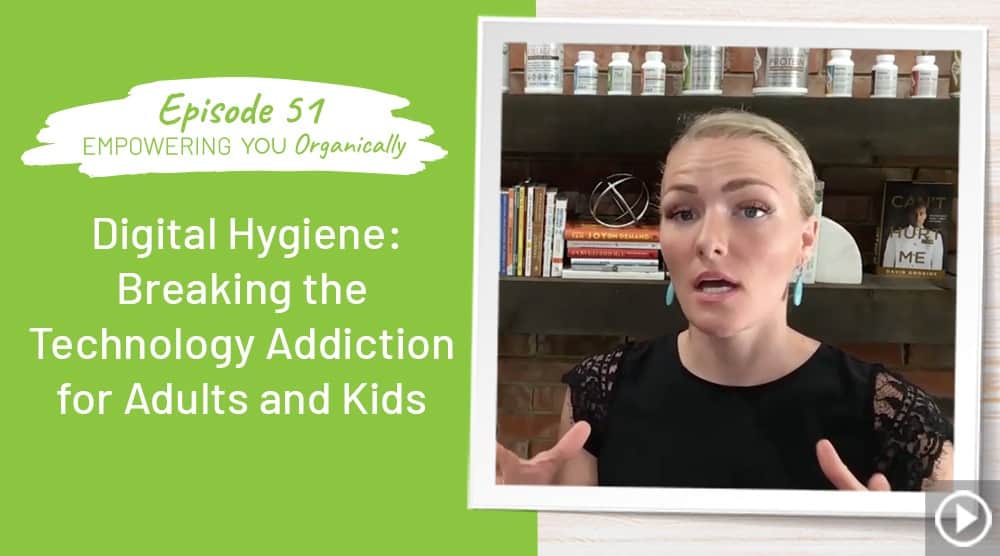Empowering You Organically – Season 7 – Episode 51
Title: Digital Hygiene: Breaking The Technology Addiction for Adults and Kids
Hosts: Jonathan Hunsaker, TeriAnn Trevenen
Guest: None
Description: Digital Addiction is back in the spotlight this week. Tune in as Jonathan and TeriAnn share more statistics on this building epidemic. Children and teens are especially negatively affected by our increasing digital addictions. Don’t despair! We have sensible tips to help us finally break the digital addiction and reconnect in a healthy way.
* * *
Featured Product
The ultimate support for healthy inflammation levels.
Pure, powerful, organic fermented turmeric.
Fermentation maximizes your body’s intake of nutrients.
Also provides you fermented vitamin D3!
Supports healthy inflammation levels
ONE-Year 100% Satisfaction Guarantee.

* * *
Understanding Behavioral Addiction
- Behavioral addiction affects a vast number of individuals and occurs when people find themselves unable to control the frequency, or amount of, a previously harmless behavior such as love, sex, gambling, work, internet and chatroom usage, shopping or exercise.
- Behavioral addictions are considered impulse‐control disorders and share many underlying similarities to substance addictions, including aspects of tolerance, withdrawal, repeated unsuccessful attempts to cut back or quit and impairment in everyday life functioning.
What Statistics Show
- Teens who spend 5 hours a day on electronic devices are 71% more likely to have suicide risk factors than those with 1 hour of use.
- Teens that spend 5 hours a day on electronic devices ate 51% more likely to get under 7 hours of sleep when compared to 1 hour of use. (Long-term issues linking to high blood pressure and weight gain)
- 8th graders who are heavy users of social media have a 27% higher risk of depression
- 67% of surveyed teachers observed students being negatively distracted by mobile devices.
- 90% of teachers stated the number of students with emotional challenges INCREASED.
- 50% of parents are concerned for the impact on their mental health
How to stop kids being addicted to their phone:
When looking to resolve teen phone addiction, the obvious option of taking your child’s phone away often doesn’t work. This can just result in the withdrawal symptoms of the internet and technology addiction. Your child or teenager will lack the maturity to realize the bigger picture, so you’re going to have to try some other tactics to evoke healthier usage.
Use apps to monitor use:
Smartphone manufacturers have been criticized for the addictive nature of their devices. Both Android and now Apple have released software that will help people curb their addition and monitor usage. The new iOS Digital Health and Android’s usage tracking can help you to know how much you or your child are actually using the device as well as the nature of the use, e.g. apps, emails, messaging.
Manage your own use:
You need to be the role model in this situation, if you spend hours looking at your phone, check it during conversations and let it come between you and family interactions then you’re setting a poor example.
Create rules around the house:
By restricting the use of smartphones in certain areas of the house or certain times you can create a much healthier environment. For example, no phones at the dinner table or after a certain time at night, perhaps even ban children/teens from having phones in their rooms at night.
Nurture other interests:
Another way to reduce how kids are addicted to phones is to involve them in more social and physical activities (sports/hobbies) to help them develop real interactions and reduce stress through exercise.
Communicate:
Spend time as a family without mobile devices, communicate and be close enough with your child to know if there are underlying problems that the overuse of smartphones is masking issues such as depression or stress relating to issues at home or school.
Self-Help Tips
We recommend using the new iOS Digital Health and Androids usage reports to keep track of the time you’re spending on your phone. The best place to start is by understanding exactly how much time you’re using your device and what apps you’re using the most.
Realize what the triggers are that make you addicted to your phone, find better uses for your time to reduce your daily stress and boredom.
Make conscious efforts to interact with people in person rather than via your phone. Our bodies and minds are built to thrive and develop off of human interactions, isolation with technology will impact you negatively.
Recognize when you’re using a smartphone as a wall. If you find it easier to communicate with others through messaging or social media or vent online, work on those skills rather than hiding behind technology.
If you’re wondering how to break cell phone addiction, the best way is to think of it as physical addiction such as smoking, drinking or eating. It’s about recognizing habits and working on slowly reducing the time to manageable amounts.
Limit times that you can use your device. Try checking your phone after meals, don’t take it with you to the bathroom and ban it from the bedroom.
Turn off your phone or put it out of sight. Placing your phone in a drawer at work or leaving it in another room to charge can help reduce the anxiety of wanting to check it.
Don’t let your phone interrupt your sleeping patterns. Looking at your tablet, phone or laptop before bed can impact the quality of sleep you get. Try turning it off.
Focus your boredom on other activities. If you’ve just sat there with the TV on in the background and scrolling aimlessly on your phone, try putting that time into the gym, a hobby or going to meet friends and catch up.
Limit times you play games or look on social media. Perhaps only use a game at certain times of the day, or try deleting social media apps you’re spending too much time on (social media being one of the primary causes of phone addiction)
Checking your phone every 5 minutes? Wait for an hour or more, you’re probably getting an underlying feeling you’re missing out, but you can wait for your fix.
* * *
Subscribe to Empowering You Organically
Never miss an episode!
APPLE PODCASTS SPOTIFY GOOGLE PODCASTS
–
Episode 51 – Hygiene: Breaking The Technology Addiction for Adults and Kids




